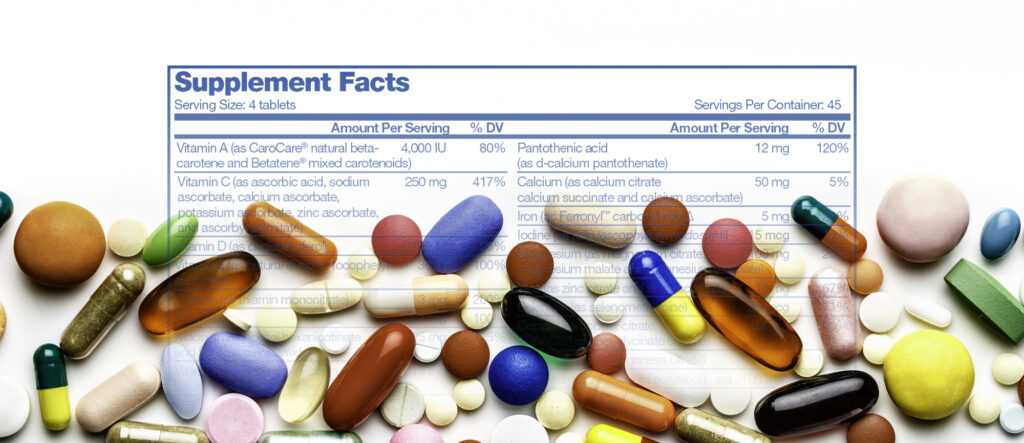Have you ever heard of 1-(4-hydroxybenzyl)-1,2,3,4-tetrahydroisoquinoline-6,7-diol or 4-[2-(dimethylamino)ethyl]phenol? Probably not. How about higenamine or hordenine? That may be more likely, but did you know that 1-(4-hydroxybenzyl)-1,2,3,4-tetrahydroisoquinoline-6,7-diol and higenamine are actually the same ingredient? The same is true for 4-[2-(dimethylamino)ethyl]phenol and hordenine.
Ingredient names can be confusing because manufacturers don't always follow guidelines set by the FDA, which generally require the use of the common name of an ingredient on the label. Some manufacturers list the chemical name, while in other instances there may be more than one common name. LegitScript analysts navigate the convoluted world of dietary supplement ingredients every day, and in this blog post we highlight some problematic ingredients with alternate names that consumers, supplement sellers, and payment service providers will want to be aware of.
Tricky Problematic Ingredients
Higenamine and hordenine are two of the most recent ingredients to join the FDA's Dietary Supplement Ingredient Advisory List, which is intended to alert the public and others about ingredients found in dietary supplements that are under increased scrutiny by the FDA because they do not appear to be lawfully included in products marketed as dietary supplements. Following evaluation by the FDA, dietary supplements containing these ingredients may be considered misbranded or adulterated.
Because supplements, unlike drugs, do not have to obtain pre-market approval before being sold, products containing problematic ingredients such as these often are not discovered until after they enter the market. This gives consumers and supplement retailers an important reason to have a heightened awareness of dietary supplement ingredients that have been deemed illegal or are under evaluation.
But what happens when the ingredients consumers should avoid can appear on dietary supplement labels as any of almost 20 different names? It is easy for even the most cautious consumers and supplement retailers to be confused.
The following list of prohibited dietary supplement ingredients includes a sample of their numerous alternate names:
BMPEA is an unapproved amphetamine-like substance that has typically appeared in supplements for use in weight loss and bodybuilding. Other names include:
-
- 1-phenyl-1-methyl-2-aminoethane
-
- 1-amino-2-phenylpropane
-
- 2-phenyl-1-propanamine
-
- 2-phenylpropan-1-amine
-
- 2-phenylpropylamine
-
- alpha-benzylethylamine
-
- β-methylphenethylamine
-
- β-methylphenylethylamine
-
- βMePEA
-
- beta-methylphenethylamine
-
- B-methyl-phenylethylamine
-
- beta-methylbenzeneethanamine
-
- beta-phenylpropylamine
-
- R-beta-methylphenethylamine
-
- R-beta-methylphenethylamine HCl
-
- R-beta-methylphenylethylamine
DMAA is an amphetamine derivative that has most often appeared in supplements for sports performance and weight loss products. The FDA states that the substance raises blood pressure, which can lead to potentially dangerous cardiovascular problems. Alternate names include:
-
- 1,3-dimethylamylamine
-
- 1,3-DMAA
-
- 1,3-dimethylpentylamine
-
- 2-amino-4-methylhexane
-
- 2-hexanamine,4-methyl-(9CI)
-
- 4-methyl-2-hexanamine
-
- 4-methyl-2-hexylamine
-
- dimethylamylamine
-
- geranamine
-
- methylhexanamine
-
- methylhexanenamine
DMBA is a substance that appeared in weight loss and sports nutrition products after the FDA's ban of DMAA. It appears to have similar properties. Other names include:
-
- 1,3-dimethylbutanamine
-
- 1,3-dimethylbutylamine
-
- 2-amino-4-methylpentane
-
- 2-amino-4-methylpentane citrate
-
- 4-amino-2-methylpentane citrate
-
- 4-amino methylpentane citrate
-
- 4-AMP
-
- 4-AMP citrate
-
- 4-amino-2-pentanamine
-
- 4-methyl-2-pentanamine
-
- amperall
-
- AMP
-
- AMP citrate
-
- methylpentanamine
In April 2019, the FDA issued nine warning letters to companies whose products were marketed as dietary supplements and labeled as containing DMHA. The administration determined that DMHA is either a "new dietary ingredient" for which the FDA has not received the required New Dietary Ingredient notification, or that it is an unsafe food additive. Alternate names include:
-
- 1,5-dimethylhexylamine
-
- 1,5-DMHA
-
- 2-amino-5-methylheptane
-
- 2-amino-6-methylheptane
-
- 2-aminoisoheptane
-
- 2-heptylamine, 6-methyl-
-
- 2-isooctyl amine
-
- 2-metil-6-amino-eptano
-
- 6-amino-2-methylheptane
-
- amidrine
-
- octodrine
-
- vaporpac
Higenamine is a substance with stimulant properties that has appeared in supplements such as pre-workouts. Other names include:
-
- (+-)-1,2,3,4-Tetrahydro-1-((4-hydroxyphenyl)methyl)-6,7-isoquinolinediol
-
- (+-)-Demethylcoclaurine
-
- (+-)-Norcoclaurine
-
- (+-)-O-Demethylcoclaurine
-
- (R)-Higenamine
-
- (R,S)-Norcoclaurine
-
- 1-(4-hydroxybenzyl)-1,2,3,4-tetrahydroisoquinoline-6,7-diol
-
- 1-[(4-hydroxyphenyl)methyl]-1,2,3,4-tetrahydroisoquinoline-6,7-diol
-
- 1-(p-hydroxybenzyl)-6,7-dihydroxy-1,2,3,4-tetrahydroisoquinoline
-
- 1-(4-Hydroxybenzyl)-1,2,3,4-tetrahydro-6,7-isoquinolinediol
-
- 6,7-Isoquinolinediol, 1,2,3,4-tetrahydro-1-((4-hydroxyphenyl)methyl)-, (+-)-
-
- 6,7-dihydroxy-1-(4-hydroxybenzyl)-1,2,3,4-tetrahydroisoquinoline
-
- 6,7-Dihydroxy-1-[(4-hydroxyphenyl)methyl]-1,2,3,4-tetrahydroisoquinoline
-
- DL-DEMETHYLCOCLAURINE
-
- Isoquinolin-6,7-diol, 1,2,3,4-tetrahydro-1-[4-hydroxybenzyl]-
-
- Norcoclaurine
Hordenine
Hordenine can be found in some algae, cacti, and grass species, but it can also be created synthetically. It has appeared in some dietary supplements used for athletic performance and weight loss. Alternate names include:
-
- 4-[2-(dimethylamino)ethyl]phenol
-
- anhaline
-
- eremursine
-
- N,N-dimethyltyramine
-
- peyocactine
-
- p-hydroxy-N,N-dimethylphenethylamine
In April 2019, the FDA issued three warning letters to companies with products labeled as containing phenibut, which is sometimes marketed for use as a sleep aid, but which doesn't meet the definition of a dietary ingredient. Alternate names include:
-
- 4-amino-3-phenylbutamoic acid
-
- 4-amino-3-phenylbutyric acid
-
- beta-(aminomethyl)hydrocinnamic acid
-
- β-phenyl-γ-aminobutyric acid
-
- β-(aminomethyl)benzenepropanoic acid
-
- fenibut
-
- phenigam
-
- phenigamma
-
- phenygam
-
- PhGaba
We're Here to Help
Want to know if a specific product is problematic? Reach out to us on our contact page and we'd be happy to look it up for you in our extensive product database, which has more than 170,000 drugs, supplements, and other healthcare products.




